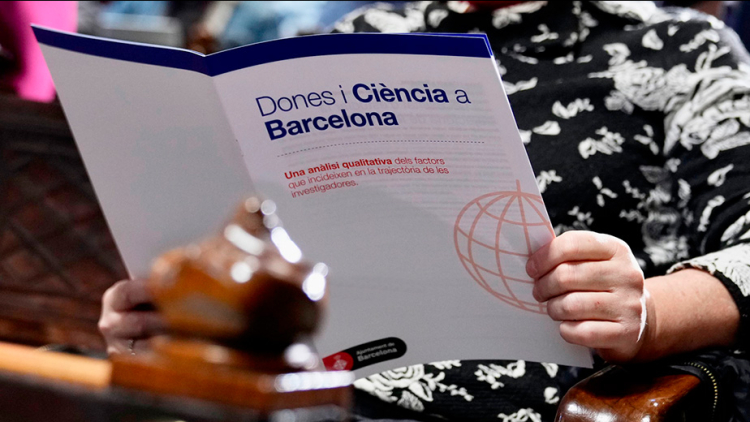'Women and Science in Barcelona' Report (2022)
With the aim of promoting a Barcelona of science and knowledge that overcomes the historical inequalities between men and women, the study Women and Science in Barcelona is presented. A qualitative analysis of the factors that affect the careers of women researchers.
The aim of the study is to carry out a diagnosis to improve municipal policies on equality in science. The document, therefore, sets the starting point for a long-term strategy to build a more feminist city, also from a scientific perspective, in Barcelona.
The study has been elaborated through the stories of people who have collaborated, on the one hand, and the compilation, categorisation and interpretation of information by the research team, on the other. Through eight discussion groups, women of different ages, from different areas of knowledge, from different types of research centres and women at different stages of their careers have contributed their experiences in order to reflect the diversity of existing female researchers. The study also contrasted these contributions with two focus groups made up of male researchers.
Recommendations
The following ten recommendations are derived from the study to guide future measures or public policies aimed at alleviating existing gender inequalities in the scientific fabric.
Presentation of the study
Coinciding with the International Day of Women and Girls in Science, on 11 February, the Saló de Cent of the City Council hosted an event at which the conclusions and recommendations of this study were presented.
The event was chaired by the Mayoress of Barcelona, Ada Colau, and included a colloquium by various scientists to discuss the conclusions and other aspects of the study.
The participants in this debate were Eva Anduiza, Professor of Political Science at the Autonomous University of Barcelona, Alba Cervera, senior researcher at the Barcelona Supercomputing Center, Carme Junyent, Senior Lecturer in Linguistics at the University of Barcelona, and Natàlia Vilor-Tejedor, postdoctoral researcher in Neurogenetics at the Centre for Genomic Regulation and the Barcelona Beta Brain Research Center, moderated by the journalist specialising in science and health Núria Jar.
Conclusions
The work has made it possible to detect and qualitatively analyse factors that affect the careers of female researchers and logics that characterise the scientific context and its relationship with gender mandates.
The conclusions include the impact of motherhood on the uninterrupted and full-time nature of a female researcher's career, the difficulty of combining caring tasks with research and the detection of a strongly masculinised academic culture.
The study also concludes that gender stereotypes are very present in the scientific context and are evident in the division of tasks within research teams. Other aspects highlighted in the conclusions are the lack of references and examples for young female researchers in some fields, or the network system of alliances and extra-occupational contacts, which are more difficult for female scientists to access when these networks perpetuate and drag along masculinised relationship models.



